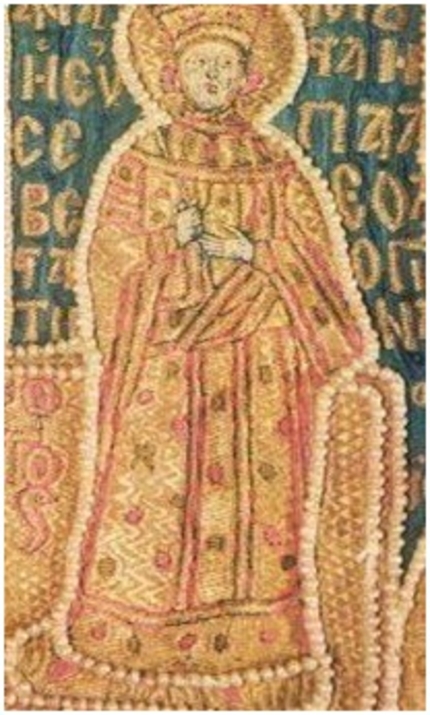
ANNA VASILIEVNA PALAIOLOGOS(born in 1393 - † in August 1417 in Constantinople), the Byzantine empress, since 1411the first wife of John VIII Palaiologos, since 1411 the co-ruler of his father, the Byzantine emperor Manuel Palaeologus
Father
- Vasily I Dmitrievich, the Grand Prince of Moscow and Vladimir (1389-1425)
Mother
- Sophia Vitovtovna, the Grand Princess of Moscow, the wife of Vasily I Dmitrievich, daughter of the Grand Duke of Lithuania Vitautas the Great
Biography
Anna was born around 1393. She was the first daughter of Vasily I Dmitrievich and Sophia Vitovtovna, she was the granddaughter of the Grand Duke of Lithuania Vitautas by her mother and Dmitri Donskoy by her father.
She was faced with an honorable and very important mission - to seal the alliance of the Moscow state and Byzantium. It is impossible to say unequivocally which side was the initiator of the marriage of Anna and John Palaeologus, the son of the Byzantine emperor Manuel II. The marriage was beneficial to both parties. The Byzantine Empire was going through hard times and an alliance with the young, but rapidly gaining strength Moscow principality, could have helped in the fight against the opponents of Christianity in the East [2, Ch. III]. Kinship with the Palaeologus significantly strengthened the position of the Moscow princes in the international arena. However, Anna never became the Byzantine ruler, as Vasily I expected.
According to most researchers, the wedding of Anna and John took place in 1411 [II, p. 162; 1, p. 37; 3, p. 23] or in 1414 [4, p. 17] with the assistance of Metropolitan Photius. Arriving in Constantinople, Anna lived there for several years and died unexpectedly in 1417 during an outbreak of plague in the Byzantine capital [III, p. 98]. However, V.A. Kuchkin, relying on the testimony of S. Herberstein [I, p. 315], believes that in 1411 Anna only became engaged to a Byzantine prince. Due to the young age of the princess, the wedding was to take place later and in 1417 Anna arrived in Constantinople just for the upcoming marriage. Unfortunately, the wedding did not take place due to illness and death of the princess [IV, no. 1003, s. 94; 3, p. 23].
Both versions have their weak points. Given the approximate date of birth of Anna, 1393, it is easy to assume that in 1411 she was already about 18 years old (in 1414even older). The minimum age for marriage for girls in Rus and Byzantium was 12 years. Therefore, the postponement of the wedding due to the young age of the princess in this case could hardly have taken place. On the other hand, if Anna nevertheless married the heir to the Byzantine emperor and lived for several years in Constantinople as a legal wife, the fact that during this time she never had children is questionable. However, an explanation could be that John Palaeologusafter Anna's death in two following marriages remained childless.
Anna was buried in the Lipsa convent in Constantinople.
Court
Hieromonk Zosima, author of “The Journey of the Monk Zosima”
Sources
I. Gerbershtein S. Zapiski o Moskovii. T. II. M., 2008.
II. PSRL. T. XVIII. Simeonovskaia letopis'. M., 2007.
III. Historia Byzantina of Michælis Ducæ Nepotis. Harvard, 1834.
IV. Prosopographisches Lexikon der Palaiologenzeit. T. I. Wien, 1976.
Bibliography
1. Boguslavskii V.V. Slavianskaia entsiklopediia. Kievskaia Rus'–Moskoviia: v 2-kh tomakh. T. 1: A–M. M., 2003.
2. Kloss B.M. Ocherki po istorii russkoi agiografii XIV–XVI vv. M., 2001.
3. Kuchkin V.A. Moskovskie Riurikovichi (genealogiia, demografiia) // Istoricheskii vestnik, 2013. № 04 (151). S. 6–73.
4. Panova T.D. Kremlevskie usypal'nitsy. Istoriia, sud'ba, taina. M., 2003.
Internet Resources
1. Kloss B.M. Ocherki po istorii russkoi agiografii XIV–XVI vv. M., 2001
2. Historia Byzantina of Michælis Ducæ Nepotis. Harvard, 1834
